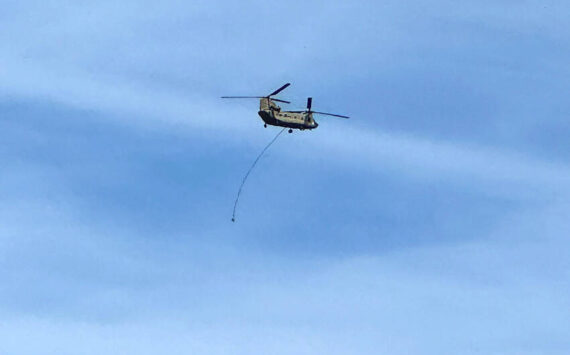TONASKET – The Tonasket City Council hosted a special meeting on Tuesday, Jan. 4 to speak with residents of the Seventh Street/Mill Drive area about the city’s plans to annex the area and provide water and sewer.
“The previous council had the vision and desire to help assist with the cleanup of Bonaparte Creek,” Mayor Patrick Plumb said. “We were really close to getting a grant to fund the water/sewer project in 2010 and we missed it by about six or seven points. Where we lost points was the grant committee wanted to know if people were going to hook their sewers up to the system once the city provides it.”
Plumb explained that he and the current council have changed the city’s water policy so that residents in the annexed area will be allowed to keep their wells as long as they’re used for irrigation purposes and there is no cross-contamination with the drinking water. These residents will need to allow their wells to be inspected annually to ensure there is no cross-contamination.
The problem with Bonaparte Creek discovered by the Okanogan Conservation District is that human fecal coliform was found in there. Since human fecal coliform can only live about one mile to one and a half miles from the source and five hot spots were found in the last one mile of the creek, it is clear the source is coming from the area the city wants to annex, although no one specific resident or sewer system was declared as the source.
“We feel the area is essentially already part of our city,” Plumb said. “It has been talked about since before I was born to make that area part of the city. The state is looking for commitment at this point and we’re willing to be committed with you and be the lead agency on this project.”
From there, Contract City Planner Kurt Danison took over the meeting to answer questions from the residents who attended.
“There’s a process the city has to go through to annex,” Danison explained. “We have to have ten percent of the property owners in the area approach the city and ask for annexation and then 60 percent of the area has to sign a petition stating they want annexation. If the area remains unincorporated, the city can not require landowners to connect to the sewer system if they put one there.”
One main purpose of this meeting was to get more approval from the residents before the city council makes their final decision on whether they’ll reapply for the Community Development Block Grant for this project. As of press time, the council had not made that decision at their meeting on Tuesday, Jan. 11.
“The only cost as a landowner you should see is once you’re connected to the system, you have to start paying a monthly fee for services, if everything works out the way we want it to,” Danison said. “We’re going for the maximum amount we can get from a CDBG, which is three-quarters of a million dollars. Anyone with irrigation wells will have to absorb the cost of installing a meter on the well and of having it checked annually for cross-contamination.”
If the area is annexed into Tonasket, the difference in property taxes for residents is minimal. For the annexation area, Okanogan County is collecting $40,045.04 in total property taxes while the Tonasket will collect $41,741.85, which is only a $1,696.81 difference. The levy rate will change from 10.99 for county taxes to 11.46 for city taxes.
For residents currently living outside of the city, the monthly water rate is $40.88 while those living in the city are paying $27.25. The sewer rates within the city are also lower, with outside residents paying $35.61 and city residents paying $30.61.
Finally, Danison provided written information to those in attendance that stated the benefits for landowners if the area is annexed with a sewer extension. These benefits are: all lands within the project area would be annexed and the city receives a CDBG grant to pay for the majority of the cost of designing and constructing the sewer collection line extension, existing water customers will see a one-third percent reduction in their monthly water bills, access to city services will increase property values, ground and surface water quality will improve and there will be faster police response times.
If annexation is not done but a sewer extension is provided the benefits for landowners are: no properties are annexed but landowners agree to connect to the extended sewer system (again funded by a CDBG), access to city services will increase property values, ground and surface water quality will improve and if funding is secured as the city is seeking, there will be little to no cost for residents of the area.
The only benefit listed for the city will be a slightly higher increase in the amount of property taxes the city collects.





